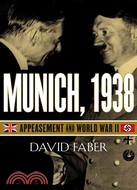| FindBook |
有 1 項符合
Munich, 1938: Appeasement and World War II的圖書 |
 |
Munich, 1938: Appeasement and World War II 作者:David Faber 出版社:Simon & Schuster 出版日期:2009-09-01 規格:24.1*15.9*4.4cm |
| 圖書館借閱 |
| 國家圖書館 | 全國圖書書目資訊網 | 國立公共資訊圖書館 | 電子書服務平台 | MetaCat 跨館整合查詢 |
| 臺北市立圖書館 | 新北市立圖書館 | 基隆市公共圖書館 | 桃園市立圖書館 | 新竹縣公共圖書館 |
| 苗栗縣立圖書館 | 臺中市立圖書館 | 彰化縣公共圖書館 | 南投縣文化局 | 雲林縣公共圖書館 |
| 嘉義縣圖書館 | 臺南市立圖書館 | 高雄市立圖書館 | 屏東縣公共圖書館 | 宜蘭縣公共圖書館 |
| 花蓮縣文化局 | 臺東縣文化處 |
|
|
- 圖書簡介
On September 30, 1938, British Prime Minister Neville Chamberlain flew back to London from his meeting at Munich with the German Chancellor Adolf Hitler and was greeted with a hero's welcome. As he paused on the aircraft steps, he held aloft the piece of paper, bearing both his and the Führer's signatures, which contained the promise that Britain and Germany would never go to war with each other again. Later that evening, from his upstairs window at 10 Downing Street, he told the ecstatic and thankful crowd that he had returned bringing "Peace with honour -- Peace for our time."
In this important reappraisal of the extraordinary events of seventy years ago, acclaimed historian David Faber traces the key incidents leading up to the meeting at Munich and its immediate aftermath. He describes Lord Halifax's ill-fated visit to Hitler; Chamberlain's secret negotiations with Mussolini, followed by the resignation of Foreign Secretary Anthony Eden; and the Berlin scandal that rocked Hitler's regime. Faber takes us to Vienna for the Nazi Anschluss; to the Sudentenland, the mountainous border region of Czechoslovakia, where Hitler's puppets attempted to provide him with a pretext for war by inciting the minority German population to rebellion; and to Prague, where the Czechoslovak government desperately tried to head off the Führer's warlike intentions. In Berlin, we witness Hitler inexorably preparing for war, even in the face of opposition from his own generals; and in London, we watch helplessly as Chamberlain seizes executive control from his own cabinet and makes one supreme effort after another to appease Hitler, culminating in his three remarkable flights to Germany.
Drawing on a wealth of original archival material, including diaries and notes taken by Hitler and Chamberlain's translator, Faber's sweeping reassessment of the events of 1938 resonates with an insider's feel for the political infighting he uncovers. Packed with narrative punch and vivid characters, Munich, 1938 transports us to the war rooms and bunkers, revealing the secret negotiations and scandals upon which the world's fate would rest. It is modern history writing at its best.
- 作者簡介
David Faber is the author of Speaking for England and was a member of Parliament for Westbury between 1992 and 2001. A historian and writer, he lives in London.
|











